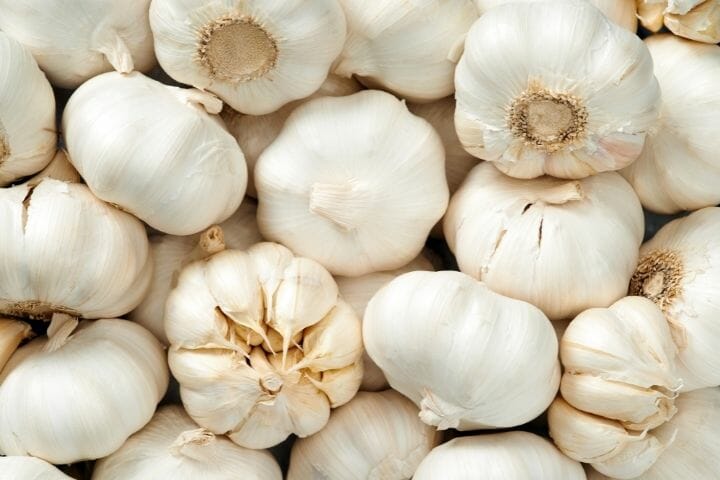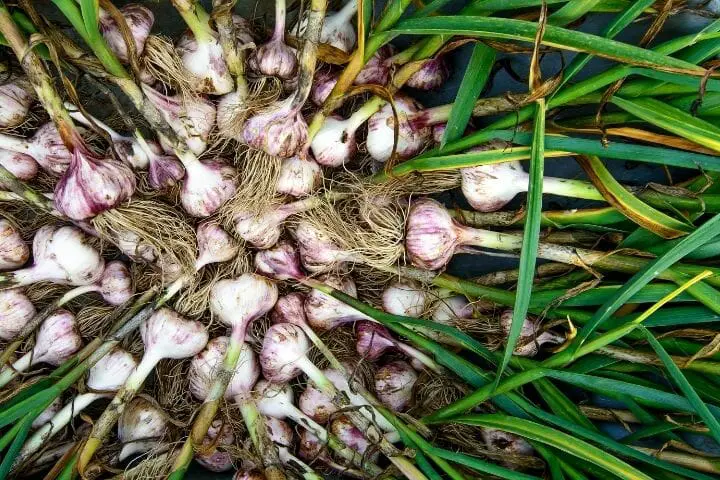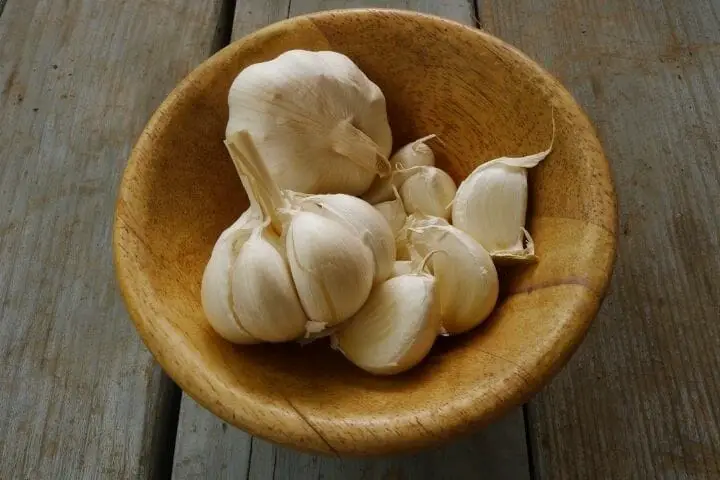Many herbs and spices have multiple medicinal benefits. Team Respect Caregivers brings you the benefits of garlic in food and how it can be a great way to stay healthy.
Contents
Garlic has been a culinary staple for years, and it continues to be so today. The properties of this plant, which include antibacterial and antiseptic properties, make it effective in treating and preventing illness.
Several of garlic’s health advantages are attributable to its active ingredient, Allicin. This article will explore the health benefits of garlic and the evidence to support these claims.
The Rich History of Garlic
People in many regions of the globe have traditionally depended on garlic for medicinal purposes as well as adding flavor to a variety of dishes. Garlic was reportedly in use around the time of construction of the Giza pyramids, about 5,000 years ago.

Garlic was mentioned by Hippocrates (approx. 460-370 BC) (considered today as “the founder of Western medicine) to treat a broad variety of ailments and illnesses, according to Richard S. Rivlin in the Journal of Nutrition.
For respiratory disorders, parasites, poor digestion, and weariness, Hippocrates and others of his time advocated the use of garlic. Whether eaten raw or cooked, garlic may have several health benefits to offer.
Garlic Health Benefits: What are the Claims?
Garlic is often given for various ailments, including atherosclerosis (hardening of the arteries), high cholesterol, heart attack, coronary heart disease, and hypertension.
Garlic is still used as a preventive strategy for various disorders, including lung disease and prostate cancer, as well as breast cancer and stomach cancer, even in the contemporary day by certain people. But, unfortunately, few of these uses have been scientifically demonstrated to be effective or beneficial.
You might like to read: Quick and Easy Healthy Meals to Prepare for Seniors
Garlic Health Benefits: What is the Evidence?
Garlic has been investigated for its possible medical properties in several academic studies. The findings are summarized below.
Lung Cancer
According to a study conducted by the Jiangsu Provincial Center for Disease Control and Prevention, lung cancer incidence was shown to be 44% lower in individuals who took raw garlic at least twice per week over a seven-year trial period.
To conduct their research, they had face-to-face interviews with 1,424 lung cancer patients and 4,543 healthy individuals. Apart from diet and lifestyle, they were questioned on everything from whether or not they smoked to how often they consumed garlic.
According to the study’s authors, raw garlic intake may have a protective effect against lung cancer. There is a positive correlation between raw garlic consumption and lung cancer in a dose-response pattern

Brain Cancer
There is evidence that the organo-sulfur compounds found in garlic may have the ability to destroy malignant cells in glioblastomas, a kind of brain tumor. Trusted Source
In a study conducted at the Medical University of South Carolina, researchers discovered that the pure organo-sulfur compounds found in garlic, DAS, DADS, and DATS “demonstrated efficacy in destroying brain cancer cells,” with DATS proving to be the most efficient.
It is shown in this research that plant-derived compounds have a substantial promise as a natural treatment for restricting the malignant development of human brain tumor cells.
Dr. Ray Swapan, Ph.D., a co-author of the study, adds that “more study in brain tumor animal models is needed before this therapeutic strategy may be applied to people who have brain tumors.”
Osteonecrosis of the Hip
Osteoarthritis was less prevalent in women who consumed a lot of allium vegetables in their diet.
An investigation proving this was undertaken by a team from King’s College London and the University of East Anglia in England was published in BMC Musculoskeletal Disorders. Rakkyo, garlic, leeks, shallots, and shallot greens are among the vegetables that belong to the allium family.
The researchers evaluated over 1,000 healthy female twins. They observed that individuals who had a diet rich in fruits and vegetables, “particularly alliums like garlic,” were less likely to develop hip joint osteoarthritis.
Antibacterial Agent
According to a study published in the Journal of Antimicrobial Chemotherapy, the diallyl sulfide molecule found in garlic was 100 times more effective than two commonly used antibiotics in treating Campylobacter bacterial infection.
According to lead author Dr. Xiaonan Lu of Washington State University, “This finding is very exciting to me because it reveals that this chemical has the potential to remove disease-causing microorganisms in the environment and our food supply.”

Keeping the heart healthy
According to Emory University School of Medicine experts, a component found in garlic oil known as diallyl trisulfide has been demonstrated to help protect the heart before and after cardiac surgery.
According to the researchers, diallyl trisulfide may have the potential to be used to treat heart failure in the future.
Hydrogen sulfide gas is known to help keep the heart healthy. The difficulty is that it is a very combustible material, making administering it as a therapy challenging.
As a result, scientists decided to focus their efforts on diallyl trisulfide, a component of garlic oil, as a safer method of transferring hydrogen sulfide benefits to the heart.
According to the Journal of Agricultural and Food Chemistry, garlic oil may protect people with diabetes against cardiomyopathy.
When it comes to people with diabetes, cardiomyopathy is by far the most prevalent cause of death. A chronic ailment is defined as having an abnormally enlarged, bloated, and stiff myocardium (heart muscle) for an extended period.
The researchers gave the diabetic rats either garlic oil or maize oil, depending on their preference. When compared to animals fed maize oil, those fed garlic oil exhibited much greater levels of genetic changes associated with protection against heart damage.
Ultimately, the researchers concluded that garlic oil “had significant potential for protecting hearts against diabetes-induced cardiomyopathy.”
High Cholesterol
Researchers at Ankara University investigated the impact of garlic extract supplementation on the lipid (fat) profile of patients who had high cholesterol levels. In the journal Nutritional Biochemistry, their study was presented when it was submitted to publication.
In this study, there were 23 subjects, all of whom had high cholesterol levels, and 13 of whom also had high blood pressure. They were divided into two categories to make things easier:
- Those who have increased cholesterol levels but no indications of hypertension fall into this classification (normal blood pressure).
- Patients with high blood pressure and increased cholesterol (high blood pressure).
- They were given supplements containing garlic extract for four months. Their blood lipids, kidney, and liver functions were assessed throughout that time.
Following the trial’s findings, which lasted four months, the researchers concluded that taking a garlic supplement improves lipid profiles, increases antioxidant capacity, and decreases blood pressure levels.
Consequently, the amount of oxidation product (MDA) in blood samples decreases, showing that the body’s oxidation processes have been slowed.

Uterine Lining Cancer
Researchers from the Department of Urology at Beijing Friendship Hospital investigated the relationship between Allium vegetable consumption and the risk of prostate cancer in this study.
In the Asian Pacific Journal of Cancer Prevention, which collated and examined studies published from May 2013 to the present, the researchers reported their findings.
When researchers looked at the consequences of consuming meals rich in allium plants, notably garlic, they discovered a reduced incidence of prostate cancer.
Furthermore, because of a scarcity of relevant studies, the team concluded that further, well-designed prospective studies were required to confirm their findings.
You might like to read: 14 Lesser-Known Benefits Of Turmeric
Injuries to the Liver by Excessive Alcohol
When alcoholic beverages are used in large quantities over a lengthy period, the user may suffer liver damage.
Investigators from Shandong University’s Institute of Toxicology wanted to discover whether diallyl disulfide (DADS), an organosulfur compound derived from garlic, might protect against the oxidative stress caused by ethanol.
Biological Chemistry and Physiology Acta reported the results of their investigation. The researchers discovered that DADS might be able to protect the liver against the effects of ethanol.
Premature Birth
Having a preterm delivery is more likely among pregnant women who have had a germ infection. Researchers from the Division of Epidemiology at Norway’s National Institute of Public Health investigated the risks of preterm birth and antimicrobial infections (NIPH). The study was then published in the Journal Of Nutrition. The study showed that intake of garlic was associated with a lower risk of preterm delivery.
Common Cold and Garlic
Treatment of the Common Cold in Children and Adults,” a study conducted by experts at St. Joseph Family Medicine Residency in Indiana, was published recently in American Family Physician (June 2010).
According to the findings of their study, “Prophylactic use of garlic may reduce the occurrence of colds in adults, but it does not affect the duration of symptoms.” Using medication to prevent sickness is known as “prophylactic use.”

The Bottom line
Even though some researchers suggest that raw garlic provides the most health benefits, other studies have looked at total allium intake and shown benefits from raw and cooked allium consumption. To take advantage of the health advantages of garlic, a variety of approaches have been developed as a consequence.
Not to be overlooked in your diet is the significance of flavor. When we love the food we eat and learn to follow our signals for fullness, it may be more fulfilling as well. That should provide even more encouragement to add garlic in your next meal.
References
